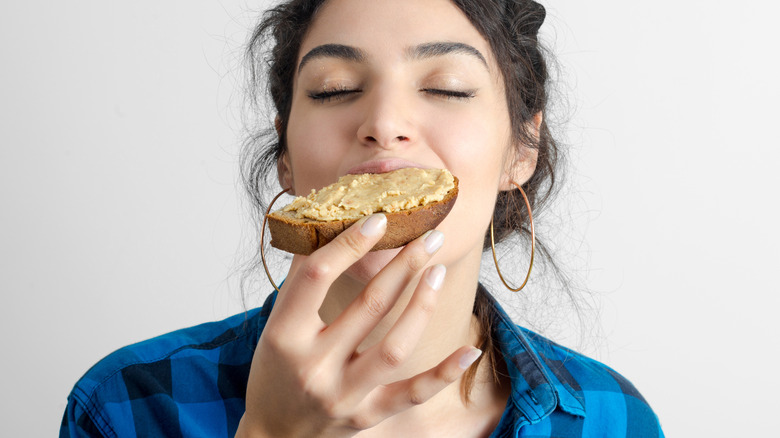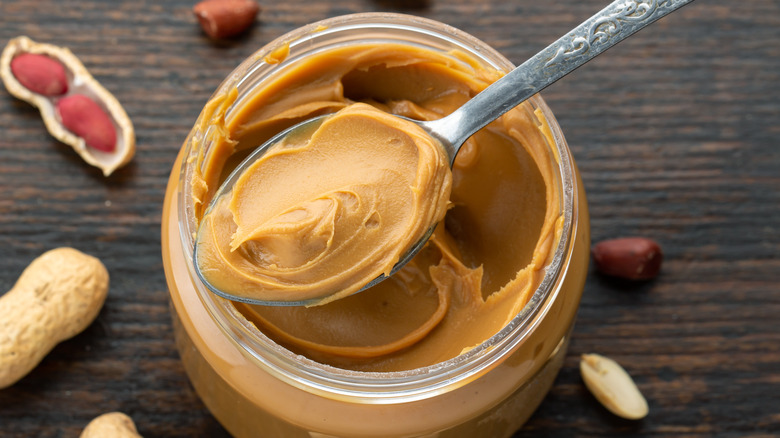What Happens To Your Skin When You Eat Peanut Butter Every Day
In the U.S., peanut butter consumption is at an average of 4.25 pounds per capita. Slather some on warm toast in the mornings, throw a few tablespoons in with a smoothie, or turn to it when you're baking some desserts; whichever way you want to use it, its nutty and rich flavor shines through. When a food is loved this much, it's natural to wonder what really happens to your body when you eat it every day.
The healthy fats in peanut butter (oleic acid) are good for your heart health and in reducing your risk of diabetes. The antioxidants (manganese, vitamin E, and B vitamins) reduce inflammation and prevent chronic disease. And the protein and fiber content in this popular breakfast food can keep you feeling full for longer, which means it's a great addition to your diet if you're watching your weight (via WebMD).
If you're conscious of the health of your skin, you may have wondered what this nut butter can do for you. As it turns out, quite a lot. The vitamin E found in peanut butter is linked to protecting your skin against sun damage, according to Cleveland Clinic. In addition to putting you at risk of skin cancer, exposing yourself to the harmful effects of ultra violet (UV) light can lead to photoaging, or premature aging of your skin. Eating peanut butter regularly could keep those fine lines and wrinkles at bay.
The healthy fats in peanut butter can improve your skin health, too
Ever wondered what helps — from the inside out — to keep your skin glowing and moisturized? The healthy fats (monounsaturated and polyunsaturated fats) we consume through our diet. Peanut butter has a lot of these healthy fats. Hydrated skin is also one way to prevent the signs of premature aging, like wrinkles. Plus, there's some science linking monounsaturated fats with preventing UV damage to your skin, according to a paper published in Nutrients. The omega-3 and omega-6 fatty acids found in this nut butter help with cell membrane health too, per WebMD.
Peanut butter also contains quite a lot of protein, which is essential for collagen and keratin production and protection from free radicals, both of which benefit your skin. Furthermore, peanut butter contains lutein, a carotenoid with anti-inflammatory properties that is often associated with preventing age-related macular disease. Lutein is also linked with increasing your skin's elasticity.
But even with its many benefits, there are some things to consider if you want to eat peanut butter every day for skin health.
Concerns regarding peanut butter and skin health
Experts agree that while eating the recommended amount of peanut butter every day (2 tablespoons or 32 grams per day) is good for your health, there is also such a thing as eating too much peanut butter. Peanut butter is a calorie-dense food, so you can easily consume too many calories if you go overboard.
Skin-health-wise, you might tip the scales unfavorably when it comes to balancing the polyunsaturated fats (omega-3 and omega-6) in the nut spread (via Curology). Peanut butter contains more omega-6 fatty acids than omega-3, and omega-6 fats are associated with increasing inflammation in your body. For some people, this could manifest in breakouts. There is also some concern over the saturated fat content in peanut butter and the presence of lectin, which could irritate the small intestine and cause inflammation; however, more research is needed to establish a definite connection between these and acne of the skin (per Medical News Today).
Skipping the natural or organic brands and going for ones that have more sugar can also negatively impact your skin. Too much sugar in your diet is linked with loss of skin elasticity, premature aging, sagging skin, and breakouts, per Unity Point Health. So when shopping for peanut butter, choose the kinds that contain fewer or no additives.



